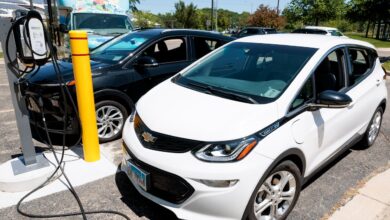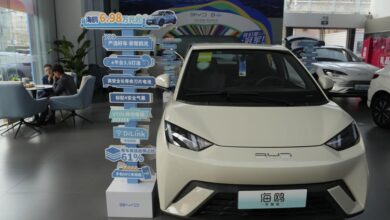Electric Cars Fuel Rise in Pedestrian Crashes, New Study Finds

Electric or hybrid cars are more likely to hit pedestrians than diesel or gasoline powered cars, a new study has found.
The research, published in the Journal of Epidemiology & Community Health, found that while the more environmentally friendly cars are good for the planet, they pose more of a safety hazard. This is largely because they are quieter. They pose a danger in urban areas, particularly where there is more background noise. This means that sometimes, pedestrians may not notice they are there.
Researchers are urging governments to take this into account as hybrid and electric vehicles become more integrated into society.
To reach their findings, researchers looked at casualty rates in Great Britain from 2013 to 2017. They then looked at differences in casualty rates for every 100 million miles of road travel.
Overall, 32 billion miles of electric/hybrid vehicle travel and 3 trillion miles of gas/diesel vehicle travel were studied. Of 916,713 casualties, 96,285 involved pedestrians being hit by a car.
According to the study, for 100 million miles of road travel, the average annual casualty rate for electric and hybrid vehicles was 5.16 and 2.40 for gas and diesel vehicles.
PinkBadger/Getty
The researchers also confirmed that accidents mainly occurred in urban areas.
Overall, the researchers concluded that electric and hybrid vehicles were twice as likely to be involved in these accidents.
“More pedestrians are injured in Great Britain by petrol and diesel cars than by electric cars, but compared with petrol and diesel cars, electric cars pose a greater risk to pedestrians and the risk is greater in urban environments,” the authors wrote in the study.
“One plausible explanation for our results is that background ambient noise levels differ between urban and rural areas, causing electric vehicles to be less audible to pedestrians in urban areas.”
The researchers note some limitations to their study, including the fact that younger, less experienced drivers were more likely to be involved in car accidents, and also, they were more likely to own these newer, electric cars.
“From a public health perspective, our results should not discourage active forms of transport beneficial to health, such as walking and cycling; rather they can be used to ensure that any potential increased traffic injury risks are understood and safeguarded against,” the authors said.
They conclude that governments and policymakers need to mitigate the risks posed to pedestrians by these newer model cars as society continues to move away from petrol and diesel cars.
Do you have a tip on a science story that Newsweek should be covering? Do you have a question about this study? Let us know via science@newsweek.com.
Uncommon Knowledge
Newsweek is committed to challenging conventional wisdom and finding connections in the search for common ground.
Newsweek is committed to challenging conventional wisdom and finding connections in the search for common ground.



